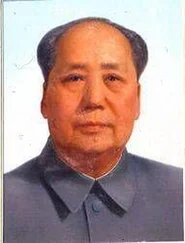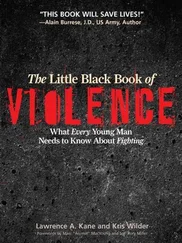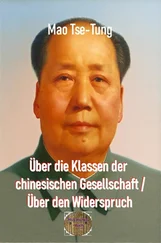Tse-tung Mao - The Little Red Book
Здесь есть возможность читать онлайн «Tse-tung Mao - The Little Red Book» весь текст электронной книги совершенно бесплатно (целиком полную версию без сокращений). В некоторых случаях можно слушать аудио, скачать через торрент в формате fb2 и присутствует краткое содержание. Жанр: Политика, на английском языке. Описание произведения, (предисловие) а так же отзывы посетителей доступны на портале библиотеки ЛибКат.
- Название:The Little Red Book
- Автор:
- Жанр:
- Год:неизвестен
- ISBN:нет данных
- Рейтинг книги:5 / 5. Голосов: 1
-
Избранное:Добавить в избранное
- Отзывы:
-
Ваша оценка:
- 100
- 1
- 2
- 3
- 4
- 5
The Little Red Book: краткое содержание, описание и аннотация
Предлагаем к чтению аннотацию, описание, краткое содержание или предисловие (зависит от того, что написал сам автор книги «The Little Red Book»). Если вы не нашли необходимую информацию о книге — напишите в комментариях, мы постараемся отыскать её.
The Little Red Book — читать онлайн бесплатно полную книгу (весь текст) целиком
Ниже представлен текст книги, разбитый по страницам. Система сохранения места последней прочитанной страницы, позволяет с удобством читать онлайн бесплатно книгу «The Little Red Book», без необходимости каждый раз заново искать на чём Вы остановились. Поставьте закладку, и сможете в любой момент перейти на страницу, на которой закончили чтение.
Интервал:
Закладка:
"On Contradiction" (August 1937), Selected Works, Vol. I, pp. 321-22.
Since they are different in nature, the contradictions between ourselves and the enemy and the contradictions among the people must be resolved by different methods. To put it briefly, the former are a matter of drawing a clear distinction between ourselves and the enemy, and the latter a matter of drawing a clear distinction between right and wrong. It is, of course, true that the distinction between ourselves and the enemy is also a matter of right and wrong. For example, the question of who is in the right, we or the domestic and foreign reactionaries, the imperialists, the feudalists and bureaucrat-capitalists, is also a matter of right and wrong, but it is in a different category from questions of right and wrong among the people.
On the Correct Handling of Contradictions Among the People (February 27, 1957), 1st pocket ed., pp. 5-6.
The only way to settle questions of an ideological nature or controversial issues among the people is by the democratic method, the method of discussion, of criticism, of persuasion and education, and not by the method of coercion or repression.
To be able to carry on their production and studies effectively and to arrange their lives properly, the people want their government and those in charge of production and of cultural and educational organizations to issue appropriate orders of an obligatory nature. It is common sense that the maintenance of public order would be impossible without such administrative regulations. Administrative orders and the method of persuasion and education complement each other in resolving contradictions among the people. Even administrative regulations for the maintenance of public order must be accompanied by persuasion and education, for in many cases regulations alone will not work.
Ibid., pp. 11-12.
Inevitably, the bourgeoisie and petty bourgeoisie will give expression to their own ideologies. Inevitably, they will stubbornly express themselves on political and ideological questions by every possible means. You cannot expect them to do otherwise. We should not use the method of suppression and prevent them from expressing themselves, but should allow them to do so and at the same time argue with them and direct appropriate criticism at them. We must undoubtedly criticize wrong ideas of every description. It certainly would not be right to refrain from criticism, look on while wrong ideas spread unchecked and allow them to monopolize the field. Mistakes must be criticized and poissnous weeds fought wherever they crop up. However, such criticism should not be dogmatic, and the metaphysical method should not be used, but efforts should be made to apply the dialectical method. What is needed is scientific analysis and convincing argument.
Ibid., pp. 55-56.
To criticize the people's shortcomings is necessary,… but in doing so we must truly take the stand of the people and speak out of whole-hearted eagerness to protect and educate them. To treat comrades like enemies is to go over to the stand of the enemy.
"Talks at the Yenan Forum on Literature and Art" (May 1942), Selected Works, Vol. III, p. 92.
Contradiction and struggle are universal and absolute, but the methods of resolving contradictions, that is, the forms of struggle, differ according to the differences in the nature of the contradictions. Some contradictions are characterized by open antagonism, others are not. In accordance with the concrete development of things, some contradictions which were originally non-antagonistic develop into antagonistic ones, while others which were originally antagonistic develop into non-antagonistic ones.
"On Contradiction" (August 1937), Selected Works, Vol. I, p 344.
In ordinary circumstances, contradictions among the people are not antagonistic. But if they are not handled properly, or if we relax our vigilance and lower our guard, antagonism may arise. In a socialist country, a development of this kind is usually only a localized and temporary phenomenon. The reason is that the system of exploitation of man by man has been abolished and the interests of the people are basically the same.
On the Correct Handling of Contradictions Among the People (February 27, 1957), 1st pocket ed., p. 14.
In our country, the contradiction between the working class and the national bourgeoisie belongs to the category of contradictions among the people. By and large, the class struggle between the two is a class struggle within the ranks of the people, because the Chinese national bourgeoisie has a dual character. In the period of the bourgeois-democratic revolution, it had both a revolutionary and a conciliationist side to its character. In the period of the socialist revolution, exploitation of the working class for profit constitutes one side of the character of the national bourgeoisie, while its support of the Constitution and its willingness to accept socialist transformation constitute the other. The national bourgeoisie differs from the imperialists, the landlords and the bureaucrat-capitalists. The contradiction between the national bourgeoisie and the working class is one between the exploiter and the exploited, and is by nature antagonistic. But in the concrete conditions of China, this antagonistic class contradiction can, if properly handled, be transformed into a non-antagonistic one and be resolved by peaceful methods. However, it will change into a contradiction between ourselves and the enemy if we do not handle it properly and do not follow the policy of uniting with, criticizing and educating the national bourgeoisie, or if the national bourgeoisie does not accept this policy of ours.
Ibid., p. 4-5.
It [the counter-revolutionary rebellion in Hungary in 1956] was a case of reactionaries inside a socialist country, in league with the imperialists, attempting to achieve their conspiratorial aims by taking advantage of contradictions among the people to foment dissension and stir up disorder. This lesson of the Hungarian events merits attention.
Ibid., p. 15.
5. WAR AND PEACE
War is the highest form of struggle for resolving contradictions, when they have developed to a certain stage, between classes, nations, states, or political groups, and it has existed ever since the emergence of private property and of classes.
"Problems of Strategy in China 's Revolutionary War" (December 1936), Selected Works, Vol. I, p. 180.
"War is the continuation of politics." In this sense war is politics and war itself is a political action; since ancient times there has never been a war that did not have a political character…
But war has its own particular characteristics and in this sense it cannot be equated with politics in general. "War is the continuation of politics by other… means." When politics develops to a certain stage beyond which it cannot proceed by the usual means, war breaks out to sweep the obstacles from the way… When the obstacle is removed and our political aim attained the war will stop. But if the obstacle is not completely swept away, the war will have to continue till the aim is fully accomplished… It can therefore be said that politics is war without bloodshed while war is politics with bloodshed.
"On Protracted War" (May 1938), Selected Works, Vol. II, pp. 152-53 *
History shows that wars are divided into two kinds, just and unjust. All wars that are progressive are just, and all wars that impede progress are unjust. We Communists oppose all unjust wars that impede progress, but we do not oppose progressive, just wars. Not only do we Communists not oppose just wars, we actively participate in them. As for unjust wars, World War I is an instance in which both sides fought for imperialist interests; therefore the Communists of the whole world hrmly opposed that war. The way to oppose a war of this kind is to do everything possible to prevent it before it breaks out and, once it breaks out, to oppose war with war, to oppose unjust war with just war, whenever possible.
Читать дальшеИнтервал:
Закладка:
Похожие книги на «The Little Red Book»
Представляем Вашему вниманию похожие книги на «The Little Red Book» списком для выбора. Мы отобрали схожую по названию и смыслу литературу в надежде предоставить читателям больше вариантов отыскать новые, интересные, ещё непрочитанные произведения.
Обсуждение, отзывы о книге «The Little Red Book» и просто собственные мнения читателей. Оставьте ваши комментарии, напишите, что Вы думаете о произведении, его смысле или главных героях. Укажите что конкретно понравилось, а что нет, и почему Вы так считаете.











